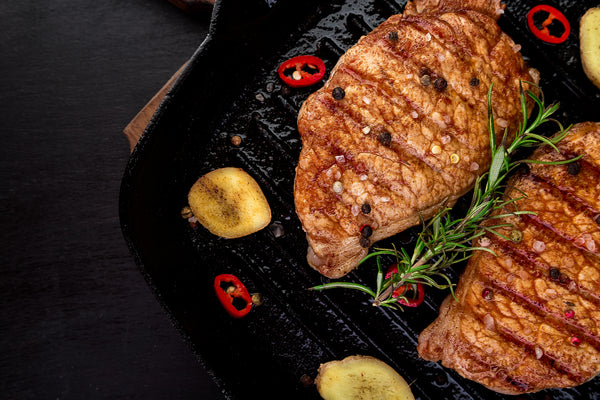
Fresh or frozen meat, does it make a difference?
Is frozen meat just as good as fresh? We’re here to debunk any myths you may have heard when it comes to choosing between fresh or frozen products for your next barbeque, dinner party or simply just a home-cooked, mid-week meal.
Meat is a staple part of most cuisines across the world. There’s nothing quite as satisfying as cutting into a juicy pork chop or perfectly cooked ribeye. Not only is meat delicious, but it’s also accessible, filling and nutritious.
Eating fresh meat is a popular option, but we believe that frozen cuts are underrated. When frozen professionally, meat is just as nutritious and tasty as the fresh version. Nonetheless, as more and more of our favourite cuts become available frozen, it’s good to know the differences, if any, between these two options.
What is frozen meat?
When you buy cuts from a butcher, the meat will most likely have been freshly prepared that morning and will be ready to cook later that day. It is no longer considered fresh meat if you opt to freeze your food instead of using it right away. In fact, as soon as the meat’s temperature drops below 0, it is classed as frozen.
Which is better for you? Fresh or frozen meat?
Initially, fresh meat has a higher nutrient count than frozen. However, fresh meat loses its vitamins and minerals as time passes. So, if you freeze your cuts and thaw them properly, or buy products that have been professionally prepared, you can retain those valuable nutrients as well as the delicious flavour. Frozen meat is also more adaptable because you can defrost, cook and eat it whenever you are ready, without the time pressure of using the product before it spoils.
What exactly happens to meat when it’s frozen?
Freezing meat slows the growth of yeast and bacteria, effectively pausing any deterioration of the product. Nonetheless, this does not mean that you can keep meat products indefinitely.
When you freeze meat, the water content within its fibres forms sharp crystals, causing the cells to break down. This process typically leads to some of the meat’s unique texture changing once thawed. However, the professional freezing process includes vacuum sealing the product to remove any air, helping to prevent ice crystals that damage the meat and better retaining its taste, colour and texture.
How long can meat be kept in the freezer?
Most uncooked cuts of meat can stay in the freezer for six months to a year. However, it’s always worth checking the specific guidelines on the label or with your supplier.
You should never keep mincemeat in the freezer for longer than four months. Steaks can be stored for up to six months but will slowly decrease in quality as time goes on.
Which cuts are better frozen?
Bone-in meat is usually the best cut of meat to freeze; for example, shoulders of lamb, beef or pork, as well as short ribs and shanks. Braise them in a stew or slow roast them for some delicious meals. Bone-in, skin-on duck and also mince of any type freeze well too and cook nicely when thawed correctly.
Poultry is an excellent resource for a busy household. Frozen chicken breasts, thighs, and drumsticks can be made into tasty family favourite dishes and are perfect for the BBQ. Just defrost thoroughly in advance before cooking.
Is a frozen steak as good as fresh?
Steak, just like any meat, holds water, but if frozen and defrosted correctly, the quality will not be affected. When you receive any frozen cut of meat, you must put it in the freezer immediately unless you plan on cooking it that day. Never store a steak in the freezer for longer than four months. If you decide to cook your steak that day, cook it as soon as the defrosting process is complete.
You may believe that a fresh steak always tastes better, but if you follow these guidelines, you’ll find that its frozen version is just as satisfying. Why not try one of our meat boxes and see for yourself. We’re convinced that you won’t be able to tell the difference in quality, fresh or frozen.
The verdict!
There’s nothing wrong with frozen food; in fact, properly freezing meat can help tenderise it. Frozen cuts can be just as tasty as their fresh versions and retain their nutritional value as long as the freezing and defrosting process has been carried correctly. Furthermore, frozen meat is also far more versatile. You can store it for months, pulling it out of the freezer whenever the occasion arises – ideal for busy families and working households.
